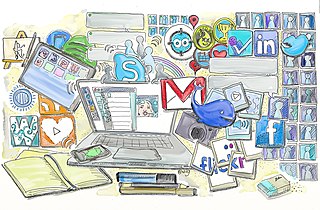ICQ New is a cross-platform instant messaging (IM) and VoIP client. The name ICQ derives from the English phrase "I Seek You". Originally developed by the Israeli company Mirabilis in 1996, the client was bought by AOL in 1998, and then by Mail.Ru Group in 2010.

Friendster was a social network based in Mountain View, California, founded by Jonathan Abrams and launched in March 2003. Later, the company became a social gaming site based in Kuala Lumpur, Malaysia. Before Friendster was redesigned, the service allowed users to contact other members, maintain those contacts, and share online content and media with those contacts. The website was also used for dating and discovering new events, bands and hobbies. Users could share videos, photos, messages, and comments with other members via profiles and networks. It is considered one of the original social networks.
The social web is a set of social relations that link people through the World Wide Web. The social web encompasses how websites and software are designed and developed in order to support and foster social interaction. These online social interactions form the basis of much online activity including online shopping, education, gaming and social networking services. The social aspect of Web 2.0 communication has been to facilitate interaction between people with similar tastes. These tastes vary depending on who the target audience is, and what they are looking for. For individuals working in the public relation department, the job is consistently changing and the impact is coming from the social web. The influence held by the social network is large and ever changing.

A social networking service or SNS is a type of online social media platform which people use to build social networks or social relationships with other people who share similar personal or career content, interests, activities, backgrounds or real-life connections.

Meebo was an instant messaging and social networking service provider. It was founded in September 2005 by Sandy Jen, Seth Sternberg, and Elaine Wherry, and was based in Mountain View, California. Initially the company offered a web-based instant messenger service, extending its offer in more general online chat and even social networking directions. In June 2012, Google acquired Meebo to merge the company's staff with the Google+ developers team.
The eCRUSH network consisted of two sites: eCRUSH.com and eSPIN.com. The network was acquired by Hearst Media on December 31, 2006. The original eCRUSH site was opened on February 14, 1999 in Chicago by Clark Benson and Karen DeMars Pillsbury. It pre-dated social networking sites such as Friendster, MySpace and Facebook.
Flixster was an American social-networking movie website for discovering new movies, learning about movies, and meeting others with similar tastes in movies, currently owned by parent company Fandango. The formerly independent site, allows users to view movie trailers as well as learn about new and upcoming movies at the box office. It was originally based in San Francisco, California and was founded by Joe Greenstein and Saran Chari on January 20, 2006. It was also the former parent company of Rotten Tomatoes from January 2010 to February 17, 2016. On February 17, 2016, Flixster, including Rotten Tomatoes, was acquired by Fandango.

Geosocial networking is a type of social networking in which geographic services and capabilities such as geocoding and geotagging are used to enable additional social dynamics. User-submitted location data or geolocation techniques can allow social networks to connect and coordinate users with local people or events that match their interests. Geolocation on web-based social network services can be IP-based or use hotspot trilateration. For mobile social networks, texted location information or mobile phone tracking can enable location-based services to enrich social networking.

Tagged is a social discovery website based in San Francisco, California, founded in 2004. It allows members to browse the profiles of any other members, and share tags and virtual gifts. Tagged claims it has 300 million members as of 2014. As of September 2011, Quantcast estimates Tagged monthly unique users at 5.9 million in the United States, and 18.6 million globally. Michael Arrington wrote in April 2011 that Tagged is most notable for the ability to grow profitably during the era of Facebook.

On the Internet, a block or ban is a technical measure intended to restrict access to information or resources. Blocking and its inverse, unblocking, may be implemented by the owners of computers using software.

Outlook.com, formerly Hotmail, is a free personal email service offered by Microsoft. This includes a webmail interface featuring mail, calendaring, contacts, and tasks services. Outlook can also be accessed via email clients using the IMAP or POP protocols.

Bebo was an American social networking website that originally operated from 2005 until its bankruptcy in 2013 and relaunched in February 2021. The site relaunched several times after its bankruptcy with a number of short-lived offerings, including instant messaging and video streaming, until its acquisition by Amazon in July 2019 when it was shut down. It was announced in January 2021 that it would be returning as a new social media site the month after. By May 2022, it had once again been shut down, without having ever left beta testing.

Venky Harinarayan is an Indian entrepreneur. He is the co-founder of Cambrian Ventures and Kosmix. Harinarayan also co-founded Junglee Corp. and played a significant role at Amazon.com in the late 1990s. Originally from Bombay, India, Harinarayan has a PhD in computer science from Stanford University and a masters from UCLA. Bachelor of Technology He completed his bachelor's degree in Computer Science from IIT Madras. While at Stanford, Harinarayan co-wrote a paper on implementing data cubes with Anand Rajaraman and Jeff Ullman, which is among the top 600 most cited computer science articles over the last 20 years.

GroupWise is a messaging and collaboration platform from OpenText that supports email, calendaring, personal information management, instant messaging, and document management. The GroupWise platform consists of desktop client software, which is available for Windows,, and the server software, which is supported on Windows Server and Linux.
Since the arrival of early social networking sites in the early 2000s, online social networking platforms have expanded exponentially, with the biggest names in social media in the mid-2010s being Facebook, Instagram, Twitter and Snapchat. The massive influx of personal information that has become available online and stored in the cloud has put user privacy at the forefront of discussion regarding the database's ability to safely store such personal information. The extent to which users and social media platform administrators can access user profiles has become a new topic of ethical consideration, and the legality, awareness, and boundaries of subsequent privacy violations are critical concerns in advance of the technological age.
EmailTray is a lightweight email client for the Microsoft Windows operating system. EmailTray was developed by Internet Promotion Agency S.A., a software development d.

Multiply was a social networking service with an emphasis on allowing users to share media – such as photos, videos and blog entries – with their "real-world" network. The website was launched in March 2004 and was privately held with backing by VantagePoint Venture Partners, Point Judith Capital, Transcosmos, and private investors. Multiply had over 11 million registered users. The company was headquartered in Boca Raton, Florida but moved to Jakarta, Indonesia early in 2012 and recently announced intentions to switch to e-commerce, dropping the social networking aspect entirely. Quantcast estimates Multiply had 2.47 million monthly U.S. unique visitors at their peak on July 30, 2012.
Zorpia is a social networking service with customers in China. Zorpia is one of the few international social networks with a Chinese Internet Content Provider license. The social networking site reports 2 million unique users per month and a total worldwide user base of 26 million. Jeffrey Ng is the company's founder and CEO of Zorpia. The privately funded company is based in Hong Kong and has 30 employees.

People was a contact management app and address book included in Microsoft's Windows 8 and 10. It allows a user to organize and link contacts from different email accounts. People has a unique graphical interface, unlike Windows Contacts' File Explorer-based interface, based on the Metro design language that had already been used for Outlook.com and the integrated online People service. In addition to being an address book, it provides a list of recent mail conversations with a selected contact. It used to also be a social media hub, in which users could integrate their social networking accounts, but API changes in both Windows and social media services caused this functionality to break.
The advent of social networking services has led to many issues spanning from misinformation and disinformation to privacy concerns related to public and private personal data.











